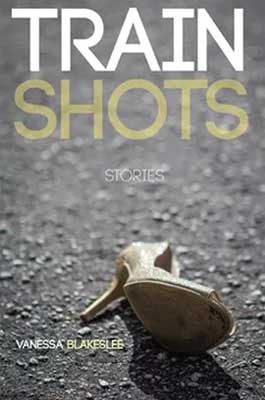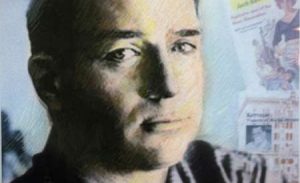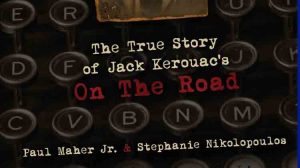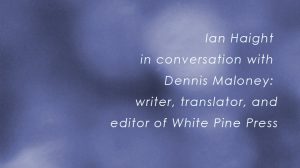Vanessa Blakeslee’s latest book, Perfect Conditions: stories (Curbside Splendor, 2018), is the winner of the 2019 IPPY Silver Medal for Short Story Fiction, finalist for the Foreword Reviews’ 2018 INDIEFAB Book of the Year Award (Short Story), and the Montaigne Medal, and was a Chicago Tribune “Summer Reads” Pick. Blakeslee’s debut novel, Juventud (Curbside Splendor, 2015), was hailed by Publishers Weekly as a “tale of self-discovery and intense first love.” The book won accolades from the Jewish Book Council, the LA Progressive, Bustle, Washington Independent Review of Books, the Rumpus, the SIBA Award/Pat Conroy Southern Book Prize, to name a few. Her story collection, Train Shots (Burrow Press) won the 2014 IPPY Gold Medal in Short Fiction, was long-listed for the Frank O’Connor International Short Story Award and optioned for a feature film. Vanessa’s writing has appeared in The Southern Review, The Paris Review Daily, Publishers Weekly, The Globe and Mail, and Kenyon Review Online, among others.
She has been awarded grants and residencies from Yaddo, Writers Omi, The Banff Centre, the Individual Artist Fellowship in Literature from the Florida Division of Cultural Affairs, and many more. She teaches writing at Rollins College and serves on the Board of Directors for the Jack Kerouac Writers-in-Residence Project of Orlando, Florida.
Madison Jade: In your collection of short stories, Perfect Conditions, your ability to tie nature into life lessons and social issues is a striking theme throughout the stories. For example, even from the first story where the narrator learns how to set traps to survive, the natural aspect is wound profoundly into the roots of this as it begins the book, setting the framework for other natural elements in the rest of the stories. What inspired you to write the collection this way?
 Vanessa Blakeslee: As I’ve matured as a person, an avid reader, and a writer, I’ve become more cognizant of how enmeshed our predicaments are, and therefore more fascinated and compelled to learn about how and why our world is in such dire straits with rising fascism, economic distress, global warming, and mass extinction. After I published my 2015 novel, Juventud, I began to ask some big questions. Why is it increasingly difficult to earn a living, to pay off debts and student loans, for myself and so many others? How is the ever-disintegrating state of the biosphere connected to economic distress, rising homelessness, and migration? How are we deluding ourselves with supposed techno-fixes that in many cases, aren’t feasible or make situations even worse? Why do stories about dystopias and totalitarian states so often portray a degraded natural environment, and a wide and violent gap between haves vs. have-nots?
Vanessa Blakeslee: As I’ve matured as a person, an avid reader, and a writer, I’ve become more cognizant of how enmeshed our predicaments are, and therefore more fascinated and compelled to learn about how and why our world is in such dire straits with rising fascism, economic distress, global warming, and mass extinction. After I published my 2015 novel, Juventud, I began to ask some big questions. Why is it increasingly difficult to earn a living, to pay off debts and student loans, for myself and so many others? How is the ever-disintegrating state of the biosphere connected to economic distress, rising homelessness, and migration? How are we deluding ourselves with supposed techno-fixes that in many cases, aren’t feasible or make situations even worse? Why do stories about dystopias and totalitarian states so often portray a degraded natural environment, and a wide and violent gap between haves vs. have-nots?
These are questions that many find frightening, but I feel a duty not to look away. Often I’m writing my own anxieties about the near-term future–most notably in stories such as “The Perfect Pantry” and “Exalted Warrior”–as an attempt at my own personal catharsis, but I hope, by this latest collection finding an audience, that readers may find catharsis as well. To know and feel that we’re not alone in our worries and fears is powerful, and one might even argue, necessary for survival.
We’re bombarded with news stories, but as a writer of fiction I’m more interested in showing how this distress manifests in individuals’ lives. I feel that I have a responsibility to understand, and if I can, bring illumination via storytelling to others, not for the sake of presenting solutions or calls-to-actions, but merely to raise awareness and, if possible, compassion for one another.
MJ: The last story of the collection relates back to the title of the book, Perfect Conditions, the short story is called this as well. Can you unpack your choice to end Perfect Conditions with this story and why the title, Perfect Conditions? It relates so much to the setting of the stories, but what other reasons might there be for this choice?
VB: The title story, “Perfect Conditions,” focuses on a father whose life has collapsed after the Great Recession attempting to make amends with his disillusioned and bitter Millennial son. My research has unveiled that we’re each very much captives of a global system that is very much beyond our control. Philip K. Dick, the science fiction writer, called our planetary predicament the “Black Iron Prison,” and I also find that moniker rings true. We can’t just blame “capitalism”; the laws of physics and energy are predatory by nature. Make of that what you will, I suppose! “Perfect Conditions,” of course, is an ironic title–the circumstances the characters find themselves in are anything but harmonious–certainly dystopian, and perhaps bordering on apocalyptic.
But what comes with these dire straits imploding in the characters’ lives, the silver lining if you will, is the opportunity to see the truth if one is willing. To reflect upon what really matters in life, to ask what kind of person we are going to be, especially in a particularly distressing situation. These are especially urgent questions for these times, but they are also the big questions human beings have always had to face. What is of value to us? What does is mean to forgive, to live with courage and grace?
The final story, “Exalted Warrior,” certainly speaks to that, and does not offer much hope for better circumstances at the end. But what that story reveals, I think, is how the characters behave as if each other’s lives matter; they refuse to be superfluous as human beings, as much as the totalitarian state would have them give in to believing. The actual physical outcome may not change, but what about the metaphysical outcome?
The final story touches back on the title story, “Perfect Conditions,” in that the latter shows how both father and son, each in their own way, got lost in the world of illusion–of making money, living comfortable lives, and became disconnected from one another. Perhaps “Exalted Warrior” even offers some kind of redemption for where many of the First World characters, both in the title story and the collection as a whole, find themselves. They’re trapped, and it’s no coincidence that the opening story to the book is called, “Traps.”
MJ: Can you explain the publication process that you have undergone in publishing Perfect Conditions? What has been the most enjoyable aspect of publishing the collection and what has been the most difficult trial of publishing it? Or, what hardships have you faced since starting your publishing career in general?
VB: With Perfect Conditions, I was fortunate to have some thorough, meticulous, and gifted editors in-house at Curbside Splendor. It’s always a wonderful feeling when you’re working with an editor who really grasps your vision, and is dedicated to making good stories truly shine. Some of these stories began long ago, at the end of my graduate studies at Vermont College of Fine Arts, and have undergone a tremendous amount of revision–both the title story and “Clinica Tikal,” in particular, come to mind. The greatest challenge with this collection was holding my feet to the fire in the editorial process, and mining stories such as “Perfect Conditions” for more depth and complexity among the characters.
As for publishing in general, or more specifically, publishing literary fiction, I find this more of an uphill battle year after year. Our culture is increasingly saturated in media and propaganda; the audience for literary fiction is there but the competition for everyone’s attention is fierce. I know I’m reading less literature than I ever have, although I find myself listening to audiobooks more.
What does this mean? I believe it means that writers dedicated to creating literary works ought to cultivate pragmatic expectations. I feel fortunate to have the small but enthusiastic fan base that I do, and in the context of small press publishing my books have done well. But with the vast majority of the public immersed in social media, gaming, Netflix, etc., writers are competing for an ever-smaller piece of the pie.
 Still, the challenge remains finding the funding and support, via fellowships and residencies, to create the work in the first place. When the work is good, I believe there will continue to be quality outlets who will be willing to publish it, and again, a group of readers for whom the book will resonate. Even if that’s just a couple of thousand readers, if the stories speak to them, for me, that’s what counts. I get messages on a regular basis from readers who write to me about Train Shots, which was my first book (2014), telling me how much they love it, five years later, as well as those who are writing to me about the new book. This always makes my day because that’s a real test, whether or not fiction holds up over time.
Still, the challenge remains finding the funding and support, via fellowships and residencies, to create the work in the first place. When the work is good, I believe there will continue to be quality outlets who will be willing to publish it, and again, a group of readers for whom the book will resonate. Even if that’s just a couple of thousand readers, if the stories speak to them, for me, that’s what counts. I get messages on a regular basis from readers who write to me about Train Shots, which was my first book (2014), telling me how much they love it, five years later, as well as those who are writing to me about the new book. This always makes my day because that’s a real test, whether or not fiction holds up over time.
I’d say in mid-life I’m less interested than I was in my youth of pumping out a vast number of books; now I’d be quite satisfied to publish fewer books, but have them be of high quality and resonate deeply with readers. I am also not sure that after writing two or three more books, that I’d have much else new to say! Time will tell.
MJ: Are there any major or challenging differences when it comes to publishing nonfiction versus fiction for you or would you say the process is fairly similar?
VB: Nonfiction tends to be more time-sensitive, and therefore involves faster editorial turn-around. If you’re pitching an essay for a place such as Publishers Weekly, LitHub, or The Paris Review Daily, the piece might be written, accepted, edited, and published within a month. I haven’t experienced that kind of speedy acceptance for short fiction, with the exception of contacting editors and stating up front that I had a story collection about to be published in a few months, and would their literary magazine be interested in featuring one of the stories? This can help drum up momentum for pre-orders. There are no guarantees, even then, that a journal will take the piece, but the responses can be warmer once you’re an established writer with a good reputation.
Whether you’re submitting fiction or nonfiction, the editor has got to make a decision based on fit. In that case, and when submitting more time-sensitive essays, you could (and often should) send a brief, professional email to check in on the piece, because if that editor is going to decline, you may be under the gun to pitch it elsewhere. So that’s very different from submitting and publishing fiction. You need to maintain a great deal of patience when submitting short fiction to well-regarded literary journals, and agents as well. You may not receive an answer for months.
MJ: As a fellow writer of both fiction and nonfiction, what advice would you give for someone who uses realism in their fiction and life events to help pilot their fiction/nonfiction work, opposed to solely writing in the nonfiction or fiction genres specifically?
VB: Trust your subconscious. Writers draw upon real-life events that happen to us and the people we know–that’s no surprise. What I wasn’t very good at, early on, was understanding how to “let go” and give my imagination full-rein. I wrote an early thesis, pre-MFA, where I was more concerned with transcribing “what had really happened to me” into fiction, because those events, at the time, felt weighty. As a result, the characters came across as too wooden, and the stories contained little subtext.
 Our failed experiments teach us a great deal, and I’m always telling my undergraduate creative writers this. Early on in life, the events that we may perceive as “big,” such as break-ups and “firsts” often are not, and when you truly have something happen that looms large, such as an unexpected loss, chances are you’ll need a certain amount of distance from it, to write well about that experience.
Our failed experiments teach us a great deal, and I’m always telling my undergraduate creative writers this. Early on in life, the events that we may perceive as “big,” such as break-ups and “firsts” often are not, and when you truly have something happen that looms large, such as an unexpected loss, chances are you’ll need a certain amount of distance from it, to write well about that experience.
Writing fiction is dreaming while you’re awake, and writing down the sensory world your protagonist is moving through, he or she driven by a particular yearning. Trust the images that come up. You’ll recognize objects and characters from real life, but the content of what you see will have a slanted quality–like in your dreams. The images and composite characters that appear provide the subtext, and the subtext speaks to what the story is truly about.
The fiction writer is a spiritual guide into the underworld, of sorts. What you bring back is what you’ve got to show to humanity, what needs to be revealed, faced, grappled with, about who we are and how we make meaning out of this otherwise chaotic and mysteriously maddening life. When we write fiction, we’re diving into the Jungian “shadow self” and unearthing the difficulties we find, for our fellow humans to learn how to, hopefully, confront with compassion, wisdom, and grace.



